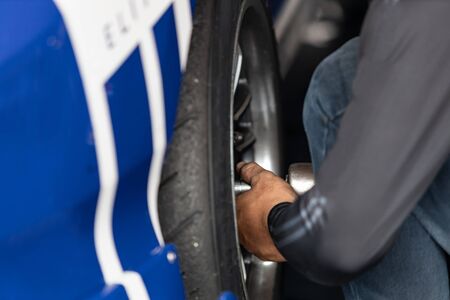Introduction: Cherishing Your Motor
There’s something truly special about owning a car in the UK—a sense of pride that goes far beyond simply getting from A to B. For many of us, our motors are more than just machines; they’re cherished companions on scenic Sunday drives through the rolling Cotswolds, or steadfast partners during the daily trundle down rain-slicked city streets. The sight of a well-loved classic Morris Minor or a tidy Ford Escort at a local meet can stir memories of family holidays, first dates, and those unforgettable road trips along the coast. It’s not just nostalgia; it’s heritage—a thread woven through generations of British motoring enthusiasts.
Caring for your car, then, is about much more than practicality or resale value. It’s about preserving a slice of your personal history and contributing to the ongoing story of Britain’s rich automotive legacy. Regular servicing isn’t just a chore; it’s an act of stewardship, ensuring your pride and joy remains roadworthy, reliable, and ready to turn heads—whether you’re popping down to the shops or heading out to the next big classic show. In this way, maintaining your motor becomes both a responsibility and a pleasure, connecting past and present with every turn of the spanner.
2. Understanding Regular Servicing: More Than Just an Oil Change
When we talk about regular servicing here in the UK, it’s far more comprehensive than just swapping out your oil and filter. For most British motorists, the annual MOT (Ministry of Transport) test is a familiar ritual—a legal requirement for vehicles over three years old. But keeping your car in fine fettle goes well beyond ticking off the MOT. A proper service schedule means giving your motor a thorough going-over, just as any classic car enthusiast would do in their home garage or shed.
What’s Involved in a British Service Schedule?
| Service Item | Frequency | Garage Lingo/Notes |
|---|---|---|
| MOT Test | Yearly (after 3 years) | Checks roadworthiness, emissions, lights, brakes, tyres—no passing, no driving! |
| Interim Service | Every 6 months or 6,000 miles | Basic fluids check, filters, visual inspection—think “quick once-over” |
| Full Service | Yearly or 12,000 miles | A comprehensive job: plugs, belts, brakes, suspension—the works |
The Enthusiast’s Approach: Lessons from Classic Car Care
If you’ve ever peeked inside a true petrolhead’s shed, you’ll spot shelves stacked with Haynes manuals, tins of grease and rows of spanners neatly hung. Enthusiasts don’t wait for something to go wrong—they’re proactive. They keep logbooks, watch for the tell-tale signs of wear and tear, and know the value of nipping problems in the bud. That same mindset applies to modern motors: follow the recommended schedule and treat every service as a chance to preserve your pride and joy.
Why This Matters for Your Car’s Value
A car with a stamped-up service book commands respect in the classifieds. Just like a classic with all its paperwork in order, a well-documented maintenance history reassures future buyers—and keeps your car running sweet for years to come.
![]()
3. Financial Sense: Protecting Your Car’s Value on the Used Market
When it comes to selling or part-exchanging your car in the UK, nothing speaks louder than a comprehensive Full Service History (FSH). A well-documented FSH is considered gold dust by both private buyers and dealerships, especially when listing your motor on popular platforms like Autotrader or visiting a local forecourt. It’s not just about oil changes and fresh filters; it’s about trust, transparency, and that all-important peace of mind for the next owner.
Potential buyers will almost always ask to see the service book. Those neat dealer stamps—each representing timely care—often make the difference between a quick sale at top money and your pride and joy languishing on the market. In fact, many used car experts estimate that having a stamped FSH can add hundreds, sometimes thousands, to your car’s resale value, particularly with cherished marques or sought-after models.
The Value of Full Service History on Resale
| Condition | Typical Impact on Resale Value | Buyer Confidence Level |
|---|---|---|
| Full Service History (FSH) | +£500 to £1,500 (model dependent) | Very High – Sought after on Autotrader & dealer lots |
| Partial Service History | No significant increase; may raise questions | Moderate – Buyers may negotiate price down |
| No Service History | -£500 or more reduction; harder to sell | Low – Often overlooked in favour of better-kept examples |
The Importance of Stamped Service Books
In classic British fashion, paperwork matters. The humble service book—often tucked away in the glovebox—is your evidence of mechanical sympathy over the years. Each stamp from a reputable garage or main dealer is an assurance that your vehicle has been maintained “by the book”. For many onlookers at a car boot sale or scrolling through Autotrader listings, those stamps are worth their weight in gold.
A Lasting Impression at Sale Time
Ultimately, keeping up with regular servicing isn’t just about reliability—it’s a wise investment in your car’s future value. When it comes time to move on, you’ll find that a full set of service records makes all the difference in achieving a swift sale at the best possible price. Whether you’re handing over keys at your local dealership or sealing a deal online, a tidy history ensures your old motor stands out from the crowd.
4. Reliability and Roadworthiness: Staying Safe on British Roads
Keeping your motor in tip-top condition is not just about aesthetics or resale value—it’s about ensuring reliability and safety, especially on the unpredictable roads of Britain. Regular servicing is the backbone of a dependable vehicle, giving you peace of mind whether you’re cruising through the Cotswolds or navigating the city centre during rush hour. For those of us with a soft spot for classic British motors—think MGBs, Triumphs, or perhaps even a trusty old Land Rover—the importance of routine checks cannot be overstated. These older machines, charming as they are, can be prone to issues like oil leaks, worn brake linings, tired electrics, and cooling system woes. Spotting these faults early during scheduled maintenance helps prevent those dreaded breakdowns on a frosty morning when you’d rather be enjoying a cuppa than waiting for the AA.
Staying Compliant with UK Regulations
In the UK, maintaining roadworthiness isn’t just good practice—it’s a legal requirement. The annual MOT test is designed to ensure your car meets minimum safety and environmental standards. Regular servicing helps prepare your vehicle for its MOT by addressing common fail points such as faulty lights, brakes, tyres, and emissions issues before they become costly headaches.
Common Issues Found in Classic British Cars
| Component | Typical Fault | Impact if Unchecked |
|---|---|---|
| Brakes | Worn pads/shoes, leaking cylinders | Poor stopping power; MOT failure |
| Cooling System | Leaky hoses/radiator; corroded water pump | Overheating; engine damage |
| Electrics | Tired wiring; faulty lighting circuits | No-starts; unsafe night driving |
| Suspension | Poor damping; perished bushes | Unstable handling; excessive tyre wear |
Catching Problems Early: A True British Advantage
The beauty of sticking to a regular servicing schedule lies in catching these niggles before they escalate. A well-looked-after classic (or any car) not only keeps you safe but also means fewer surprises come MOT time and preserves that all-important value—something every enthusiast appreciates. After all, there’s nothing quite like knowing your pride and joy will fire up reliably, even when Jack Frost has paid an overnight visit.
5. Nostalgic Value: Keeping the Spirit of Classic Cars Alive
The UK has long held a special affection for classic motors, from the humble Morris Minor to the iconic Jaguar E-Type. The joy of owning such cars isn’t simply about value on paper; it’s about preserving a living piece of history, and that spirit is kept alive through regular servicing. Tinkering under the bonnet, getting your hands oily—these are rituals cherished by enthusiasts up and down the country. Whether you’re tending to a daily runner or an old Rover tucked away in the garage, sticking to a servicing schedule means your pride and joy remains roadworthy and full of character.
The Joy of Hands-On Maintenance
There’s a unique satisfaction in carrying out regular checks—changing the oil, adjusting tappets, or replacing spark plugs. It’s not just about keeping your motor running smoothly; it’s about forming a bond with your car. For many Britons, this hands-on approach harks back to simpler times, when Sunday mornings were spent in the drive with a spanner set and a mug of strong tea. Such routines turn maintenance into a ritual, deepening the relationship between driver and machine.
Camaraderie at Local Car Clubs and Meets
Across the UK, local car clubs and classic meets are thriving hubs of community spirit. From village greens to seaside promenades, enthusiasts gather to share stories, lend tools, and offer advice. These gatherings foster camaraderie, but they also reinforce the importance of regular upkeep; after all, nobody wants to be the one stuck on the hard shoulder en route to Goodwood Revival! Here’s a look at how these clubs contribute:
| Club Activity | Benefit |
|---|---|
| Group Servicing Days | Sharing expertise and tools |
| Classic Drives & Rallies | Encouraging maintenance for reliability |
| Workshops & Talks | Learning best practices for preservation |
Preserving Value Through Community Spirit
The nostalgia surrounding classic cars isn’t just sentiment—it’s reflected in their value when well maintained. Proven service records and visible care can make all the difference at auction or private sale. By following regular servicing schedules and engaging with like-minded enthusiasts, you’re not only keeping your motor running sweet—you’re ensuring its story continues for generations to come.
6. Conclusion: Making Servicing Part of the Great British Motoring Ritual
In the UK, regular car servicing is more than just a practical necessity—its a time-honoured tradition woven into the fabric of British motoring culture. For generations, motorists have taken pride in keeping their vehicles in tip-top condition, whether its a cherished classic, a reliable family runabout, or the latest bit of modern engineering. This commitment to maintenance not only preserves your car’s value but also keeps that unmistakable sense of joy alive with every turn of the key and every Sunday jaunt through our rolling countryside.
Making servicing part of your routine ensures that your pride and joy remains safe, reliable, and ready for any adventure, from coastal escapes to village fêtes. It’s an investment in both your vehicle’s future and your own peace of mind—knowing you’re upholding the great British tradition of care and craftsmanship.
The Benefits at a Glance
| Benefit | How it Supports Value |
|---|---|
| Regular Servicing | Prevents costly repairs and sustains resale value |
| Service History Documentation | Attracts knowledgeable buyers and enhances trust |
| Well-Maintained Mechanics | Keeps performance and efficiency at their best |
| Cultural Pride | Continues the legacy of responsible motoring |
Keeping the Spirit Alive
Whether you tinker under the bonnet yourself or entrust your motor to a trusted local garage, sticking to a regular servicing schedule is all about respect—for your car, for fellow road users, and for British motoring heritage. So next time you’re planning a leisurely drive across the dales or through winding village lanes, take comfort in knowing that regular servicing keeps those wheels turning smoothly, ensuring every journey is as pleasurable as a classic Sunday drive.

